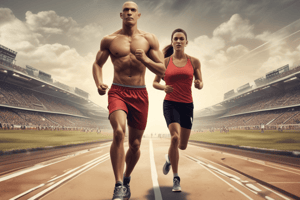Podcast
Questions and Answers
What is the primary focus of individual sports?
What is the primary focus of individual sports?
- Teamwork and communication
- Individual performance and achievement (correct)
- Physical competition and combat
- Building relationships and friendships
Which of the following is a benefit of sports for mental health?
Which of the following is a benefit of sports for mental health?
- Develops teamwork and leadership skills
- Reduces stress and anxiety (correct)
- Improves cardiovascular health
- Improves concentration and discipline
What is an example of a combat sport?
What is an example of a combat sport?
- Boxing (correct)
- Golf
- Tennis
- Volleyball
What is the purpose of sports equipment?
What is the purpose of sports equipment?
What is a common injury that can occur in sports?
What is a common injury that can occur in sports?
What is an example of a racquet sport?
What is an example of a racquet sport?
Flashcards are hidden until you start studying
Study Notes
Types of Sports
- Team Sports:
- Examples: football, basketball, soccer, volleyball, rugby
- Involve teams of players working together to achieve a common goal
- Individual Sports:
- Examples: tennis, swimming, gymnastics, track and field, golf
- Focus on individual performance and achievement
- Combat Sports:
- Examples: boxing, wrestling, martial arts, fencing
- Involve physical competition and combat between individuals
- Racquet Sports:
- Examples: tennis, badminton, squash, racquetball
- Involve hitting a ball with a racquet or paddle
Benefits of Sports
- Physical Health: Improves cardiovascular health, strength, flexibility, and coordination
- Mental Health: Reduces stress, anxiety, and depression; improves mood and self-esteem
- Social Benefits: Develops teamwork, communication, and leadership skills; builds relationships and friendships
- Cognitive Development: Improves concentration, discipline, and problem-solving skills
Sports Equipment and Facilities
- Equipment: Balls, bats, gloves, protective gear, racquets, etc.
- Facilities: Stadiums, arenas, fields, courts, gyms, pools, etc.
- Surfaces: Grass, turf, hardwood, clay, etc.
Sports Injuries and Prevention
- Common Injuries: Sprains, strains, fractures, concussions, etc.
- Prevention: Warm-up and cool-down exercises, stretching, proper training, and safety equipment
- Treatment: Rest, ice, compression, elevation (RICE); medical attention when necessary
Sports Psychology and Performance
- Motivation: Intrinsic (personal enjoyment) and extrinsic (rewards, recognition) motivators
- Goal Setting: Short-term and long-term goals; process and outcome goals
- Performance Anxiety: Managing stress and pressure to perform at a high level
Types of Sports
- Team sports involve teams of players working together to achieve a common goal, examples include football, basketball, soccer, volleyball, and rugby.
- Individual sports focus on individual performance and achievement, examples include tennis, swimming, gymnastics, track and field, and golf.
- Combat sports involve physical competition and combat between individuals, examples include boxing, wrestling, martial arts, and fencing.
- Racquet sports involve hitting a ball with a racquet or paddle, examples include tennis, badminton, squash, and racquetball.
Benefits of Sports
- Physical health benefits include improved cardiovascular health, strength, flexibility, and coordination.
- Mental health benefits include reduced stress, anxiety, and depression, as well as improved mood and self-esteem.
- Social benefits include developed teamwork, communication, and leadership skills, as well as built relationships and friendships.
- Cognitive development benefits include improved concentration, discipline, and problem-solving skills.
Sports Equipment and Facilities
- Sports equipment includes balls, bats, gloves, protective gear, racquets, etc.
- Sports facilities include stadiums, arenas, fields, courts, gyms, pools, etc.
- Sports surfaces include grass, turf, hardwood, clay, etc.
Sports Injuries and Prevention
- Common sports injuries include sprains, strains, fractures, concussions, etc.
- Prevention methods include warm-up and cool-down exercises, stretching, proper training, and safety equipment.
- Treatment methods include rest, ice, compression, elevation (RICE), and medical attention when necessary.
Sports Psychology and Performance
- Motivation types include intrinsic (personal enjoyment) and extrinsic (rewards, recognition) motivators.
- Goal setting involves setting short-term and long-term goals, as well as process and outcome goals.
- Managing performance anxiety involves controlling stress and pressure to perform at a high level.
Studying That Suits You
Use AI to generate personalized quizzes and flashcards to suit your learning preferences.




